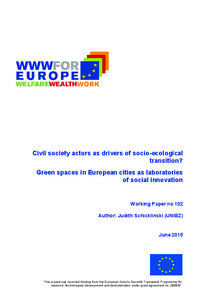Civil society actors as drivers of socio-ecological transition? - Green spaces in European cities as laboratories of social innovation
"Why are civil society dynamics concerning green spaces across European cities so interesting for socio-ecological transition? All over Europe self-organized civil society movements are emerging to tackle local challenges, becoming active players in local governance processes. These social expe...
| Main Authors: | , |
|---|---|
| Institution: | ETUI-European Trade Union Institute |
| Format: | TEXT |
| Language: | English |
| Published: |
Vienna
2015
WWWforEurope |
| Subjects: | |
| Online Access: | https://www.labourline.org/KENTIKA-19100112124919283949-Civil-society-actors-as-driver.htm |
| _version_ | 1771659896528306178 |
|---|---|
| author | WWWforEurope Schicklinski, Judith |
| author_facet | WWWforEurope Schicklinski, Judith |
| collection | Library items |
| description | "Why are civil society dynamics concerning green spaces across European cities so interesting for socio-ecological transition? All over Europe self-organized civil society movements are emerging to tackle local challenges, becoming active players in local governance processes. These social experiments have even been intensified as a result of tight public local budgets. Their activities contribute to the functioning and well-being of a European society aiming for sustainability. Preserving the availability of bio-diverse green spaces is crucial for the socio-ecological transition of cities since besides providing recreational opportunities for city dwellers, they yield essential ecological benefits from cleaning the air to reducing noise, but also provide habitat for many species and plants and reduce local vulnerabilities to extreme climate events. In cities in which local governments have severe difficulties in affording the provision of green space, new self-organized initiatives have emerged for maintaining and even developing them. Initiatives such as urban gardening have proven that people are able to cooperate, to organize themselves and to take over responsibility for green spaces as well as even introducing new practices that support the socio-ecological transition. This Milestone will contribute to the questions: -how can citizen groups contribute to maintain existing green spaces which are available and accessible for all and possibly being expanded whilst assuring biodiversity and allowing diverse use for local needs (re-creation, community-based food-production, neighbourhood culture, common intergenerational and intercultural learning etc.) at the same time; -which policy framework allows for a constructive collaboration between local authorities, administration, economic actors and citizens, enabling innovative solutions in the area of urban food production, green-space management and participative urban development." |
| format | TEXT |
| geographic | EU countries |
| id | 19100112124919283949_7a3c3bf9cf7f4bafa5d1d2737b9b54fa |
| institution | ETUI-European Trade Union Institute |
| is_hierarchy_id | 19100112124919283949_7a3c3bf9cf7f4bafa5d1d2737b9b54fa |
| is_hierarchy_title | Civil society actors as drivers of socio-ecological transition? - Green spaces in European cities as laboratories of social innovation |
| language | English |
| physical | 72 p. Digital |
| publishDate | 2015 |
| publisher | Vienna WWWforEurope |
| spellingShingle | WWWforEurope Schicklinski, Judith civil society governance innovation social participation sustainable development urban area urban development Civil society actors as drivers of socio-ecological transition? - Green spaces in European cities as laboratories of social innovation |
| thumbnail | https://www.labourline.org/Image_prev.jpg?Archive=107791392597 |
| title | Civil society actors as drivers of socio-ecological transition? - Green spaces in European cities as laboratories of social innovation |
| topic | civil society governance innovation social participation sustainable development urban area urban development |
| url | https://www.labourline.org/KENTIKA-19100112124919283949-Civil-society-actors-as-driver.htm |

